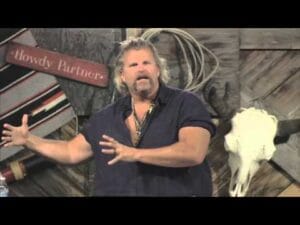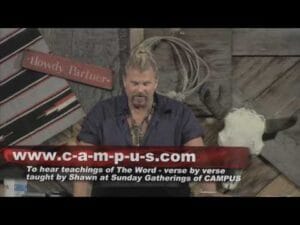
A Biblical Response, Part 3
Shawn McCraney advocates for church-state separation, critiques LDS polygamy, promotes Total Reconciliation, and emphasizes faith unity over doctrinal disputes.

Shawn McCraney advocates for church-state separation, critiques LDS polygamy, promotes Total Reconciliation, and emphasizes faith unity over doctrinal disputes.

Shawn McCraney launches a Christian TV network, critiques Mormon racial history, and emphasizes Jesus' identity through five witnesses, challenging LDS doctrinal consistency.

Shawn's teachings focus on accountability to God, biblical interpretation, and independence from external influences. He emphasizes truth over popularity, discusses contentious topics, and highlights the concept of "first-fruits" in God's plan. The Heart of the Matter Network promotes genuine biblical teaching without prosperity theology or political agendas, supporting underfunded voices.

Shawn challenges traditional soteriology, emphasizing God's omnipotence, mercy, and human free will. He views eternal punishment as restorative, aiming for universal reconciliation through Jesus.

Shawn McCraney emphasizes openness to change in religious beliefs, contrasts Jesus' teachings of humility with Calvinism's predestination, and highlights free will in salvation.

Shawn McCraney advocates for biblical alignment in Christian beliefs, critiques religious constructs, emphasizes liberty and love in faith, and questions Calvinist doctrines.

Shawn McCraney analyzes the influence of Swedenborg on Joseph Smith, contrasting Calvinist and LDS views on atonement, and Smith's synthesis of diverse religious ideas.

Shawn McCraney contrasts grace-based Christianity with works-based systems like Mormonism, critiques Calvinism's predestination, and discusses free will in salvation.

Shawn McCraney distinguishes between Mormons and Mormonism, promotes true worship in spirit and truth, aids Born-Again Mormons, and challenges traditional evangelical views.

Shawn McCraney emphasizes Christian love, Bible study, and music in spiritual growth. He critiques Calvinism vs. Mormonism, promotes doctrine over tradition, and values resilience.

Shawn McCraney critiques LDS growth claims, emphasizing true Gospel focus on Jesus, not institutional practices. He highlights issues with LDS history, doctrine, and retention, urging personal faith discovery.

Shawn critiques LDS leaders, contrasts Joseph and Chuck Smith's teachings, challenges Calvinism, and discusses Protestant reformers, emphasizing Christ's atonement and grace.

Shawn McCraney stresses faith, Bible engagement, and core Christian tenets, critiques Mormonism's focus on worldly achievements, and promotes diverse scriptural interpretations.

Shawn McCraney critiques Mormonism and Christian dogma, emphasizing biblical accuracy over myths. He advocates open theological dialogue, focusing on faith in Jesus for salvation.

Shawn McCraney contrasts Mormonism with biblical Christianity, advocating personal faith without mediation. His ministry focuses on scripture, personal responsibility, and direct God communication.

Shawn McCraney critiques Mormonism, emphasizing truth and integrity in faith. He contrasts LDS temple practices with biblical teachings, advocating for direct divine guidance.

Shawn McCraney critiques Mormonism's ties to Freemasonry, emphasizes organic ministry growth, and discusses Christian music's positive spiritual impact.

Shawn McCraney critiques Mormonism, emphasizing biblical study, spiritual truth, and grace over law. He advocates personal faith, critiques institutional control, and supports cultural boycotts.

Shawn McCraney contrasts Mormonism and Biblical Christianity, emphasizing salvation by faith, critiques LDS temple practices, and highlights issues of honesty and control in LDS rituals.

Shawn McCraney critiques Mormonism, contrasts it with Biblical Christianity, and emphasizes personal faith, questioning institutional beliefs, and focusing on Jesus' teachings.